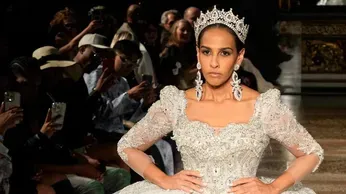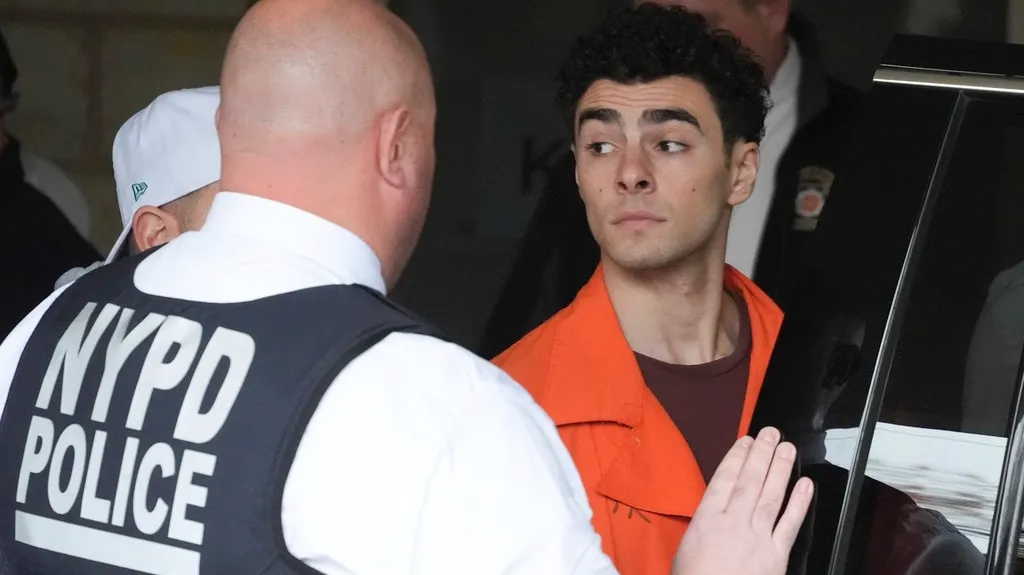
Sporting suits and sunglasses, the pair stride into a dimly lit room full of slickly dressed men smoking cigars.
All to the roar of trumpets.
The scene is from "La Señora," the latest music video from Colón, who spent several years working as a defense lawyer for Guzmán while he faced trial in a U.S. court. Now, at a time when regional Mexican music is becoming a global phenomenon, the 31-year-old is leveraging her association with the former leader of the Sinaloa Cartel to launch her music career under the stage name of "Mariel La Abogada" (Mariel, the Lawyer).
"La Señora" features – and pays tribute to – Guzmán's wife, who was released from prison last year and has struggled to find work. It paved the way for the two to model together last weekend during Milan Fashion Week, raising eyebrows in Italy and beyond.
"(My work) opens doors for me because of the morbid, because of people's curiosity ... They want to understand this," Colón told The Associated Press. "I've always told people that Mariel is a singer who became a lawyer."
The Puerto Rican daughter of a music director grew up listening to Mexican ballads, loving the brokenhearted passion infused in the music. She always wanted to be a singer, but her family pushed her to pursue a law degree.
She began working for Guzmán's defense team in 2018 after graduating from law school in the U.S. and stumbling upon a Craigslist ad seeking a part-time paralegal to help prepare a Spanish-speaking client for trial.
It was only later that she learned she would be working with Guzmán, taking him and Coronel as clients full time. She saw it as a "great opportunity professionally" and said she wasn't easily intimidated.
Once among the most wanted men in the world, Guzmán led his Sinaloa Cartel in a bloody war for control of the international drug trade, gaining a cinematic level of notoriety for his dramatic prison escapes before his extradition to the U.S. in 2017. Now his sons, known as "Los Chapitos," are locked in a deadly power struggle with another faction of the cartel, leaving mutilated bodies around the state capital.
"(People ask) how I can do this job, that I'm part of the mafia, how can I sleep at night?" Colón said. "I don't care what they say about me. I sleep very well at night."
Colón is one of few people who maintain regular contact with Guzmán. She visits him three times a month in the maximum security prison in Colorado where he's serving a life sentence. She declined to discuss details of Guzmán's cases, citing attorney-client privilege.
Seeking to build a rapport, Colón sings to Guzmán and other clients, who have included other Mexican drug traffickers and, for a brief time, Jeffrey Epstein, who killed himself in 2019 while awaiting trial on sex-trafficking charges.
Colón serenades Guzmán with Mexican classics from bands including Los Alegres del Barranco and Tucanes de Tijuana. To this day, she said, he's among the first to hear her new music.
"Whatever genre, anything that was coming out that I liked, I would sing it to him because he doesn't have a radio," she said.
Her musical career began little more than a year ago, when she released her first video, "La Abogada," which features Colón dressed in a pink suit, crooning to law enforcement from a courtroom. Like much of the genre, her music is diverse, ranging from percussion-heavy banda to character-focused ballads known as corridos.
"La Señora" features a table sprinkled with diamonds, Guzmán's wife astride a trotting horse and strolling beside a pool.
Colón said the song was based on Coronel's life, sending a message of redemption and second chances. It was also a way to offer the 35-year-old work, a condition of her probation.
Coronel, a former beauty queen, was released from prison last year after completing her three-year sentence for drug trafficking and money laundering in relation to her husband's drug empire. Coronel declined to be interviewed.
"A small waist and beautiful eyes. A brain for business and a strong voice for the bad boys. She only shows her affectionate side to El Chaparrito," Colón belts out in her ballad. "El Chaparrito," meaning "the little shorty," plays with Guzmán's nickname.
Colón's musical rise coincides with a relative golden age of Mexican music, which grew 400% worldwide over the last five years on Spotify. In 2023, Mexican artist Peso Pluma bested Taylor Swift as the most streamed artist on YouTube.
While corridos have dominated for more than a century, young artists have filled stadiums by twisting the style on its head, mixing classic ballads with trap in corridos tumbados.
But it also cuts to the heart of a larger debate: Does the music capture the realities facing many Mexicans or does it glorify the narco-violence long plaguing the Latin American nation?
Narco culture has long been part of corridos, with many singers idealizing traffickers as "an aspirational figure going against the system," said Rafael Saldívar, a researcher at the Autonomous University of Baja California.
"They're cultural expressions speaking to the realities of the country," Saldívar said. But "in a way they glorify these criminals, or do so in a way where some feel it's pushing this kind of lifestyle."
A classic example: king of corridos Chalino Sánchez used the violence around him in Sinaloa to spin lyrics while also calling out the "Sinaloa gang" for torturing and killing innocents. He was shot dead at a performance in the state's capital in 1992.
Last year, Peso Pluma – who paid homage to Guzmán in songs – was forced to cancel a show in Tijuana after the 25-year-old received threats from a rival of the Sinaloa Cartel that if he came it "would be your last performance."
Later, Tijuana banned the performance of narco ballads altogether to protect "the eyes and ears" of youths as it tries to contain violence. Local authorities in northern states previously banned musicians singing narcocorridos.
Colón, who hasn't gone so far as to glorify arms or drugs, is quick to defend narcocorridos.
"There's a reason why Netflix did the 'Narcos' show, it's because there's an audience for it. It intrigues people," she said. "That doesn't mean they're applauding or celebrating what this person did, but they do have a sort of admiration for this person or this person's life. Not everything is violence. These people have hearts, they have families."
While Colón plans to put out her first record in December, Coronel has leveraged "La Señora" to launch her career as a model and social media influencer.
April Black Diamond, the designer who asked Coronel and Colón to model in a side event during Milan Fashion Week, said her choice was met with "shock."
"People evolve. My platform isn't about judgment but about showing different dimensions of women, their strength, and resilience," she wrote in a statement. The next day, photos of Coronel in one of the designer's dresses appeared plastered on a billboard in New York's Times Square.
On Wednesday, Italy's National Fashion Chamber issued an "urgent" press release saying the show wasn't affiliated with official fashion week events and that brands need to follow its code of ethics.
Meanwhile, eyes on Colón and Coronel's video continue to grow, clocking around 750,000 views on YouTube.
September 29, 2024
She Defended 'El Chapo.' Now this Lawyer Is Using her Narco-Fame to Launch a Music Career
Megan Janetsky READ TIME: 5 MIN.
Riding in a black SUV with tinted windows, lawyer Mariel Colón rolls up to the gates of a remote mansion, strolling past a security guard side-by-side with Emma Coronel, the wife of notorious drug lord Joaquín "El Chapo" Guzmán.
Sporting suits and sunglasses, the pair stride into a dimly lit room full of slickly dressed men smoking cigars.
All to the roar of trumpets.
The scene is from "La Señora," the latest music video from Colón, who spent several years working as a defense lawyer for Guzmán while he faced trial in a U.S. court. Now, at a time when regional Mexican music is becoming a global phenomenon, the 31-year-old is leveraging her association with the former leader of the Sinaloa Cartel to launch her music career under the stage name of "Mariel La Abogada" (Mariel, the Lawyer).
"La Señora" features – and pays tribute to – Guzmán's wife, who was released from prison last year and has struggled to find work. It paved the way for the two to model together last weekend during Milan Fashion Week, raising eyebrows in Italy and beyond.
"(My work) opens doors for me because of the morbid, because of people's curiosity ... They want to understand this," Colón told The Associated Press. "I've always told people that Mariel is a singer who became a lawyer."
The Puerto Rican daughter of a music director grew up listening to Mexican ballads, loving the brokenhearted passion infused in the music. She always wanted to be a singer, but her family pushed her to pursue a law degree.
She began working for Guzmán's defense team in 2018 after graduating from law school in the U.S. and stumbling upon a Craigslist ad seeking a part-time paralegal to help prepare a Spanish-speaking client for trial.
It was only later that she learned she would be working with Guzmán, taking him and Coronel as clients full time. She saw it as a "great opportunity professionally" and said she wasn't easily intimidated.
Once among the most wanted men in the world, Guzmán led his Sinaloa Cartel in a bloody war for control of the international drug trade, gaining a cinematic level of notoriety for his dramatic prison escapes before his extradition to the U.S. in 2017. Now his sons, known as "Los Chapitos," are locked in a deadly power struggle with another faction of the cartel, leaving mutilated bodies around the state capital.
"(People ask) how I can do this job, that I'm part of the mafia, how can I sleep at night?" Colón said. "I don't care what they say about me. I sleep very well at night."
Colón is one of few people who maintain regular contact with Guzmán. She visits him three times a month in the maximum security prison in Colorado where he's serving a life sentence. She declined to discuss details of Guzmán's cases, citing attorney-client privilege.
Seeking to build a rapport, Colón sings to Guzmán and other clients, who have included other Mexican drug traffickers and, for a brief time, Jeffrey Epstein, who killed himself in 2019 while awaiting trial on sex-trafficking charges.
Colón serenades Guzmán with Mexican classics from bands including Los Alegres del Barranco and Tucanes de Tijuana. To this day, she said, he's among the first to hear her new music.
"Whatever genre, anything that was coming out that I liked, I would sing it to him because he doesn't have a radio," she said.
Her musical career began little more than a year ago, when she released her first video, "La Abogada," which features Colón dressed in a pink suit, crooning to law enforcement from a courtroom. Like much of the genre, her music is diverse, ranging from percussion-heavy banda to character-focused ballads known as corridos.
"La Señora" features a table sprinkled with diamonds, Guzmán's wife astride a trotting horse and strolling beside a pool.
Colón said the song was based on Coronel's life, sending a message of redemption and second chances. It was also a way to offer the 35-year-old work, a condition of her probation.
Coronel, a former beauty queen, was released from prison last year after completing her three-year sentence for drug trafficking and money laundering in relation to her husband's drug empire. Coronel declined to be interviewed.
"A small waist and beautiful eyes. A brain for business and a strong voice for the bad boys. She only shows her affectionate side to El Chaparrito," Colón belts out in her ballad. "El Chaparrito," meaning "the little shorty," plays with Guzmán's nickname.
Colón's musical rise coincides with a relative golden age of Mexican music, which grew 400% worldwide over the last five years on Spotify. In 2023, Mexican artist Peso Pluma bested Taylor Swift as the most streamed artist on YouTube.
While corridos have dominated for more than a century, young artists have filled stadiums by twisting the style on its head, mixing classic ballads with trap in corridos tumbados.
But it also cuts to the heart of a larger debate: Does the music capture the realities facing many Mexicans or does it glorify the narco-violence long plaguing the Latin American nation?
Narco culture has long been part of corridos, with many singers idealizing traffickers as "an aspirational figure going against the system," said Rafael Saldívar, a researcher at the Autonomous University of Baja California.
"They're cultural expressions speaking to the realities of the country," Saldívar said. But "in a way they glorify these criminals, or do so in a way where some feel it's pushing this kind of lifestyle."
A classic example: king of corridos Chalino Sánchez used the violence around him in Sinaloa to spin lyrics while also calling out the "Sinaloa gang" for torturing and killing innocents. He was shot dead at a performance in the state's capital in 1992.
Last year, Peso Pluma – who paid homage to Guzmán in songs – was forced to cancel a show in Tijuana after the 25-year-old received threats from a rival of the Sinaloa Cartel that if he came it "would be your last performance."
Later, Tijuana banned the performance of narco ballads altogether to protect "the eyes and ears" of youths as it tries to contain violence. Local authorities in northern states previously banned musicians singing narcocorridos.
Colón, who hasn't gone so far as to glorify arms or drugs, is quick to defend narcocorridos.
"There's a reason why Netflix did the 'Narcos' show, it's because there's an audience for it. It intrigues people," she said. "That doesn't mean they're applauding or celebrating what this person did, but they do have a sort of admiration for this person or this person's life. Not everything is violence. These people have hearts, they have families."
While Colón plans to put out her first record in December, Coronel has leveraged "La Señora" to launch her career as a model and social media influencer.
April Black Diamond, the designer who asked Coronel and Colón to model in a side event during Milan Fashion Week, said her choice was met with "shock."
"People evolve. My platform isn't about judgment but about showing different dimensions of women, their strength, and resilience," she wrote in a statement. The next day, photos of Coronel in one of the designer's dresses appeared plastered on a billboard in New York's Times Square.
On Wednesday, Italy's National Fashion Chamber issued an "urgent" press release saying the show wasn't affiliated with official fashion week events and that brands need to follow its code of ethics.
Meanwhile, eyes on Colón and Coronel's video continue to grow, clocking around 750,000 views on YouTube.







